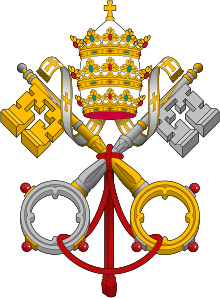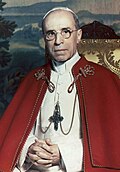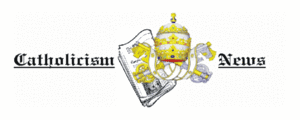Portal:Catholic Church
Introduction The Catholic Church, also known as the Roman Catholic Church, is the largest Christian church, with 1.28 to 1.39 billion baptized Catholics worldwide as of 2024. It is among the world's oldest and largest international institutions and has played a prominent role in the history and development of Western civilization. The church consists of 24 sui iuris churches, including the Latin Church and 23 Eastern Catholic Churches, which comprise almost 3,500 dioceses and eparchies around the world. The pope, who is the bishop of Rome, is the chief pastor of the church. The Diocese of Rome, known as the Holy See, is the central governing authority of the church. The administrative body of the Holy See, the Roman Curia, has its principal offices in Vatican City, a small independent city-state and enclave within the Italian capital city of Rome, of which the pope is head of state. The core beliefs of Catholicism are found in the Nicene Creed. The Catholic Church teaches that it is the one, holy, catholic and apostolic church founded by Jesus Christ in his Great Commission, that its bishops are the successors of Christ's apostles, and that the pope is the successor to Saint Peter, upon whom primacy was conferred by Jesus Christ. It maintains that it practises the original Christian faith taught by the apostles, preserving the faith infallibly through scripture and sacred tradition as authentically interpreted through the magisterium of the church. The Roman Rite and others of the Latin Church, the Eastern Catholic liturgies, and institutes such as mendicant orders, enclosed monastic orders and third orders reflect a variety of theological and spiritual emphases in the church. Of its seven sacraments, the Eucharist is the principal one, celebrated liturgically in the Mass. The church teaches that through consecration by a priest, the sacrificial bread and wine become the body and blood of Christ. The Virgin Mary is venerated as the Perpetual Virgin, Mother of God, and Queen of Heaven; she is honoured in dogmas and devotions. Catholic social teaching emphasizes voluntary support for the sick, the poor, and the afflicted through the corporal and spiritual works of mercy. The Catholic Church operates tens of thousands of Catholic schools, universities and colleges, hospitals, and orphanages around the world, and is the largest non-government provider of education and health care in the world. Among its other social services are numerous charitable and humanitarian organizations. (Full article...) Selected article
 The English Reformation was the series of events in 16th century England by which the Church of England broke away from the authority of the Pope and the Roman Catholic Church.These events were part of a wider process, the European Protestant Reformation, a religious and political movement which affected the practice of Christianity across the whole of Europe during this period. Many factors contributed to the ferment: the decline of feudalism and the rise of nationalism, the rise of the common law, the invention of the printing press and increased circulation of the Bible texts, the transmission of new knowledge and ideas not only amongst scholars but amongst merchants and artisans also; but the story of why and how the different states of Europe adhered to different forms of Protestantism, or remained faithful to Rome or allowed different regions within states to come to different conclusions (as they did) is specific to each state and the causes are not agreed.
Selected image
 Credit:Click picture for information 6th century mosaic in Ravenna portrays Jesus dressed as a philosopher king in a cloak of Tyrian purple. He appears as the Pantokrator enthroned as in the Book of Revelation, with the characteristic Christian cross inscribed in the halo behind his head. Selected biography
 Pope Pius XII (Latin: Pius PP. XII; Italian: Pio XII), born Eugenio Maria Giuseppe Giovanni Pacelli (March 2, 1876 – October 9, 1958), reigned as the 260th pope, the head of the Roman Catholic Church and sovereign of Vatican City, from March 2, 1939 until his death. Before election to the papacy, Pacelli served as secretary of the Department of Extraordinary Ecclesiastical Affairs, papal nuncio and cardinal secretary of state, in which roles he worked to conclude treaties with European nations, most notably the Reichskonkordat with Germany. His leadership of the Catholic Church during World War II and The Holocaust remains the subject of continued historical controversy. After the war, Pius XII contributed to the rebuilding of Europe, and advocated peace and reconciliation, including lenient policies toward vanquished nations and the unification of Europe. The Church, flourishing in the West, experienced severe persecution and mass deportations of Catholic clergy in Eastern Europe and China. Did you know...
Related portalsFeast Day of September 9
During the 40 years of his ministry in the New Kingdom of Granada, it is estimated he personally baptized around 300,000 people and heard the confessions of over 5,000 people per year. He is also patron saint for seafarers. He is considered a heroic example of what should be the Christian praxis of love and of the exercise of human rights. (Full article...)
Selected quote

News
SubcategoriesTopics
The Holy Bible:
Particular Churches (grouped by liturgical rite):
Things you can do
External resourcesWikiProjectsAssociated WikimediaThe following Wikimedia Foundation sister projects provide more on this subject:
Discover Wikipedia using portals |


































